Gyakorlásképp fejtsd meg
ezt a 20 kérdéses keresztrejtvényt
HOME EDUCATION témakörben! Have fun!
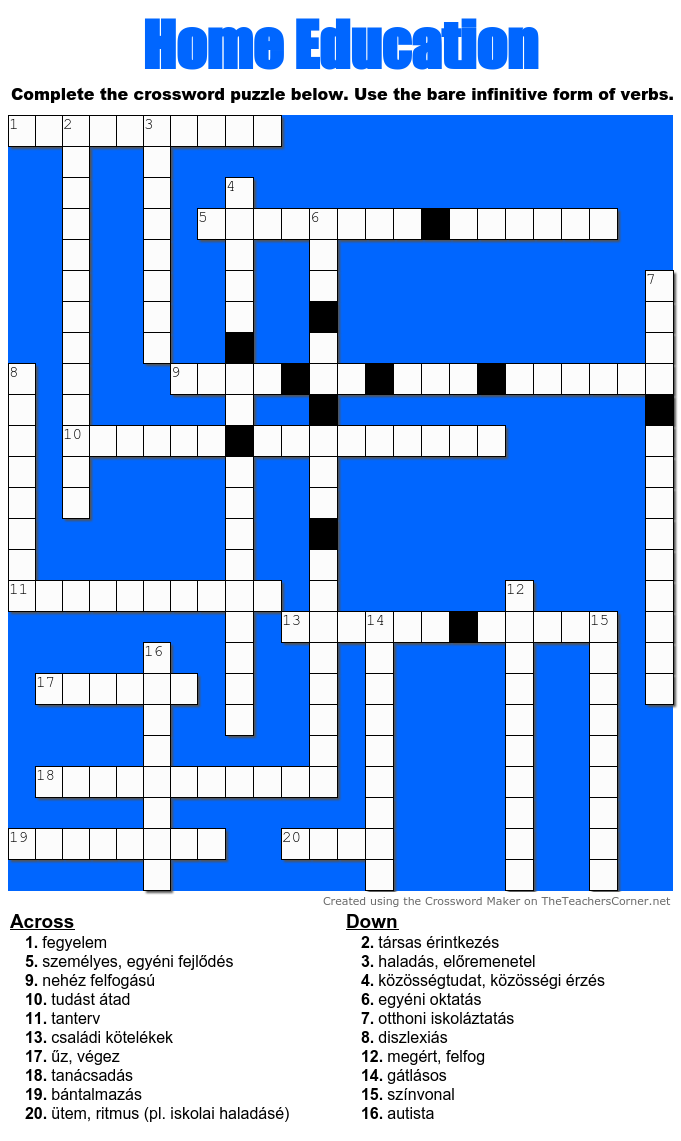
Ha megoldottad, itt tudod ellenőrizni magad:
KEY
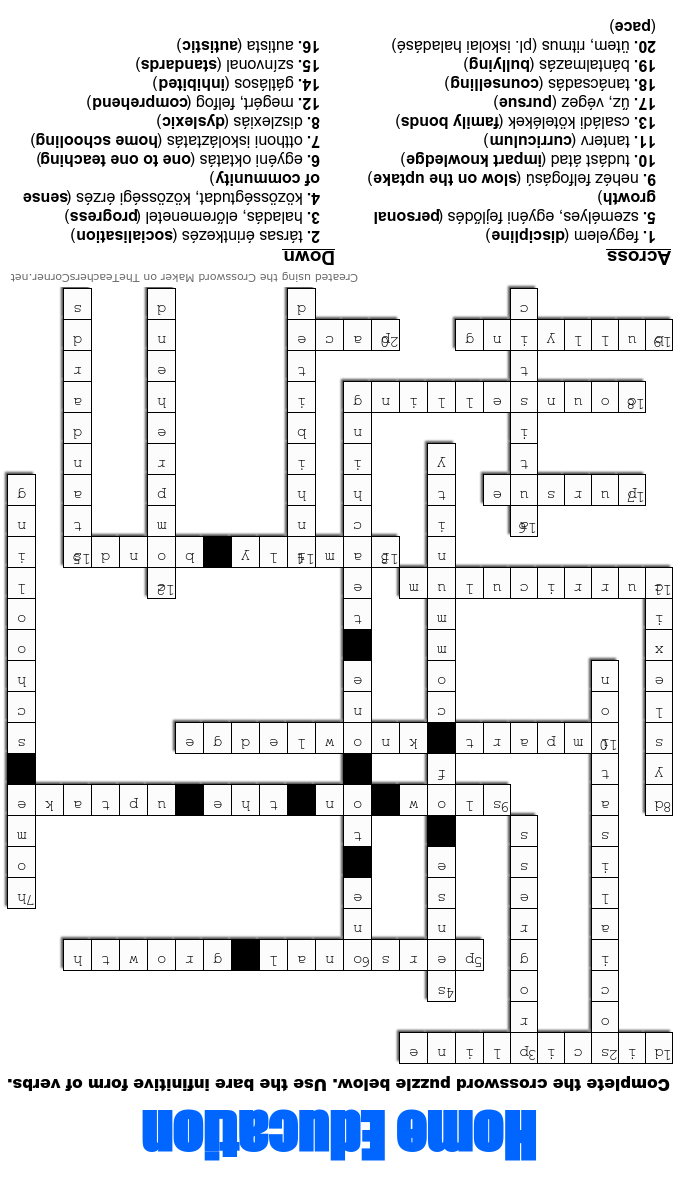
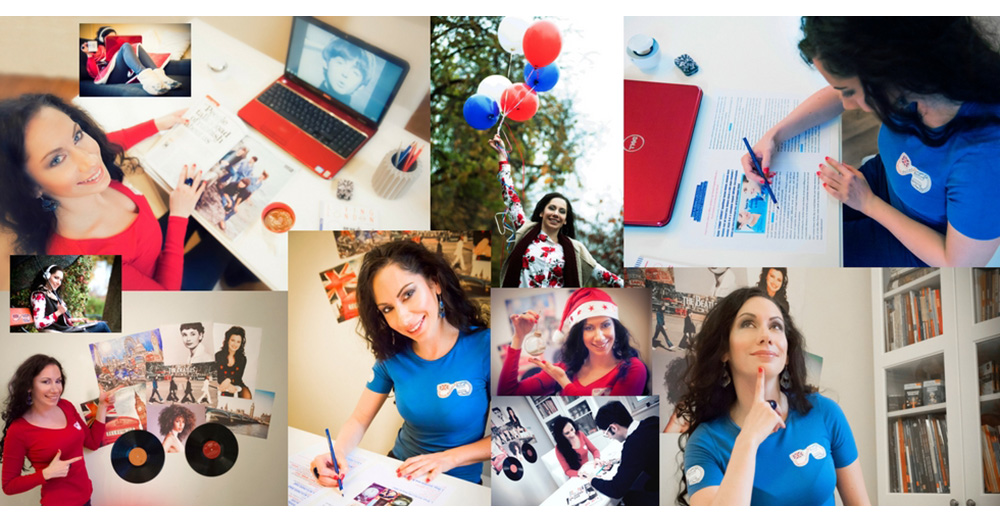
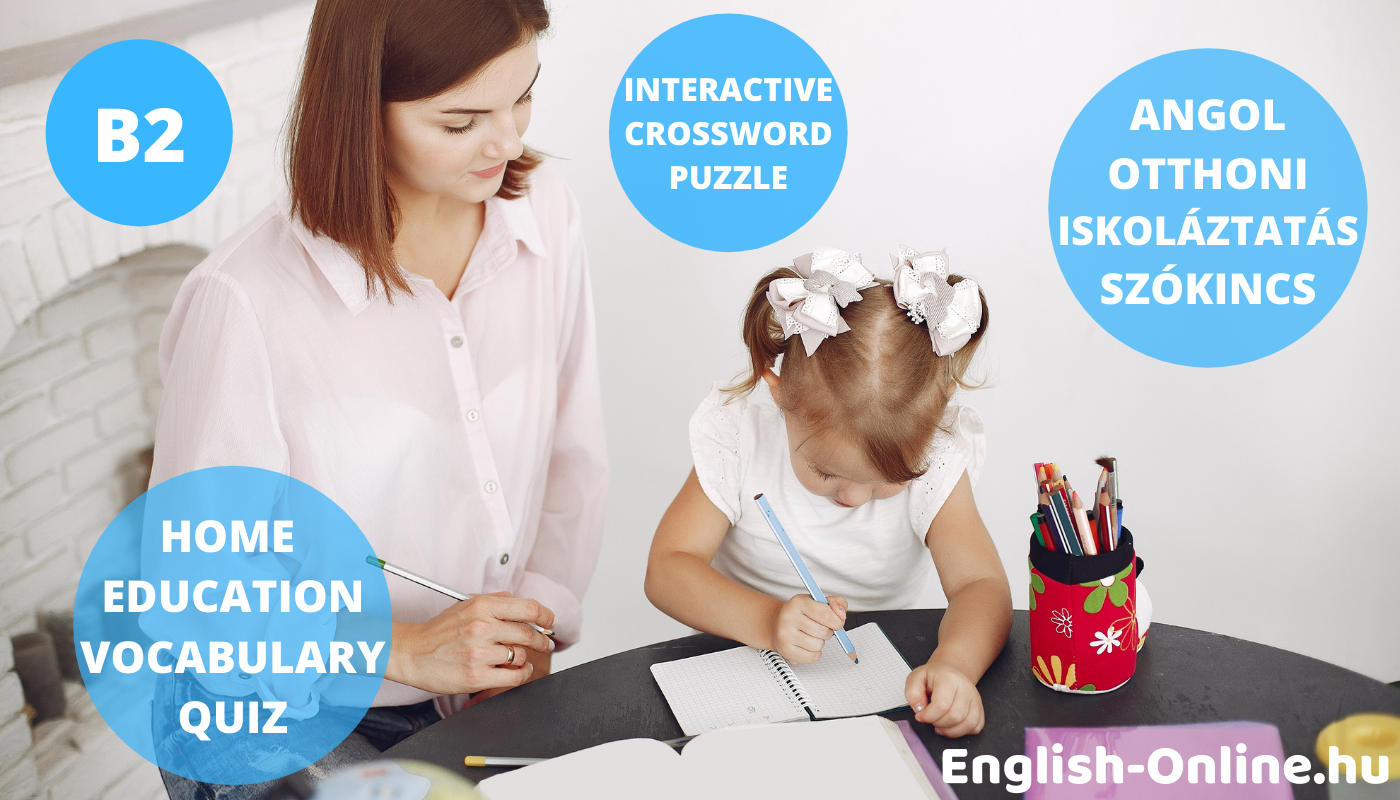



Örök inspiráció: Mr. Bean, akit nem gyakran hallunk beszélni, de ha Ő egyszer kinyitja a száját, akkor már szakértőként szólal meg. Hallgassuk meg, műértőként mit mond a következő, roppant értékes festményről egy rangos eseményen és közben töltsük ki beszéde hiányzó elemeit. Have fun! :)A FELADATOT A LENTI KÉPRE VAGY IDE KATTINTVA INTERAKTÍVAN IS MEGOLDHATOD ONLINE !!"Dr. Bean, great English arts scholar is here to speak for a few minutes (not too long, Doctor!) on the subject of our new purchase. Ladies and Gentlemen, Dr. Bean of the National Gallery London."(APPLAUSE) Mr. Bean:"Mmmm. Ah, ah. Well. Hello, I'm Dr. Bean. __________(1). And and my job is to sit and look at paintings. So, er...what have I __________(2) that I can say about this painting? Uhm. Well...well, firstly, it's quite big, which is excellent. Because if it __________(3) really small, you know, microscopic, then __________(4) anybody would be able to see it. Which would be a tremendous __________(5). Uhm...Secondly, and I'm getting quite near the end now of this... analysis... of this painting...secondly, why was it __________(6) this man here spending fifty million of your American dollars on this portrait? And the answer is, er.. well...this picture is worth __________(7) a lot of money because... it's a ... picture ... of Whistler's ... mother. And as I've learnt by staying with my best friend David Langley and his family, families are very important. And even __________(8) Mr. Whistler was perfectly __________(9) that his mother was a hideous old bat who looked like she'd had a cactus lodged up her __________(10), he stuck with her, and even took the time to paint this amazing picture of her. It's not just a painting. It's a picture of a mad old __________(11) who he thought the world of. And that's __________(12)... Well, that's what I think." |
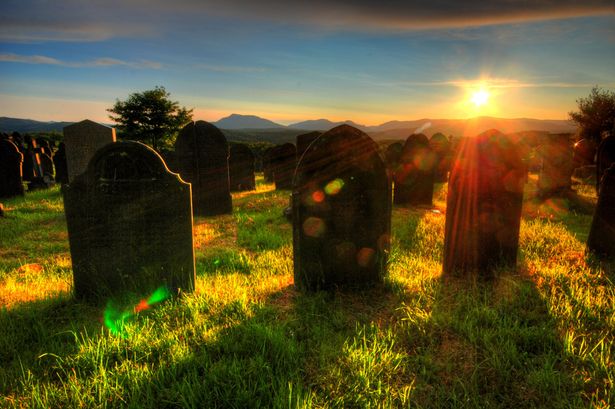
afterlife_ |
1. a formal ceremony at which a dead person is buried |
ashes_
|
2. a ring of flowers , leaves etc. as a mark of honour or respect |
bury_
|
3. cease to live/be |
catafalque_ |
4. a place for burying a corpse especially beneath the ground |
cemetery_ |
5. no longer having life |
coffin_ |
6. grave, vault, or chamber in which a dead body is buried |
corpse_ |
7. the powder that is left after a corpse is cremated |
cross_ |
8. gathering and meal following a burial service |
Day of the Dead _
|
9. put a corpse in a grave, in the earth or at sea |
dead_ |
10. a vase used for preserving the ashes of a cremated person |
death_ |
11. an upright post with a beam across, used by the ancient Romans for crucifixion |
deceased_ |
12. rest in peace |
die_ |
13. a burial ground not in the churchyard |
funeral_ |
14. a wooden framework supporting the coffin of a person during a funeral |
grave_ |
15. someone who has died recently |
gravedigger_ |
16. the ending of life |
heaven_ |
17. life after death |
hell_ |
18. feel or express grief over a death or something that is past |
last will_ |
19. a corpse (or parts of it) |
light a candle_ |
20. a box in which a corpse is buried or cremated |
mourn_ |
21. return to life |
pass away_ |
22. the dwelling place of the devil, demons and of the damned, suffering punishment |
post-funeral reception _
|
23. a dwelling place of God, his angels and the souls of those who have received salvation |
R.I.P._ |
24. ignite a wax stick to give light |
remains_ |
25. something in humans considered by some to be immortal and the centre of spiritual being |
rise from the dead_ |
26. an annual celebration to honor the spirits of the dead |
soul_ |
27. the formal expression for "die" |
tomb_ |
28. a dead human body |
urn_ |
29. a person who digs holes in the ground where corpses can be buried |
wreath_ |
30. a written statement of a person's wishes concerning the disposal of their property after death |
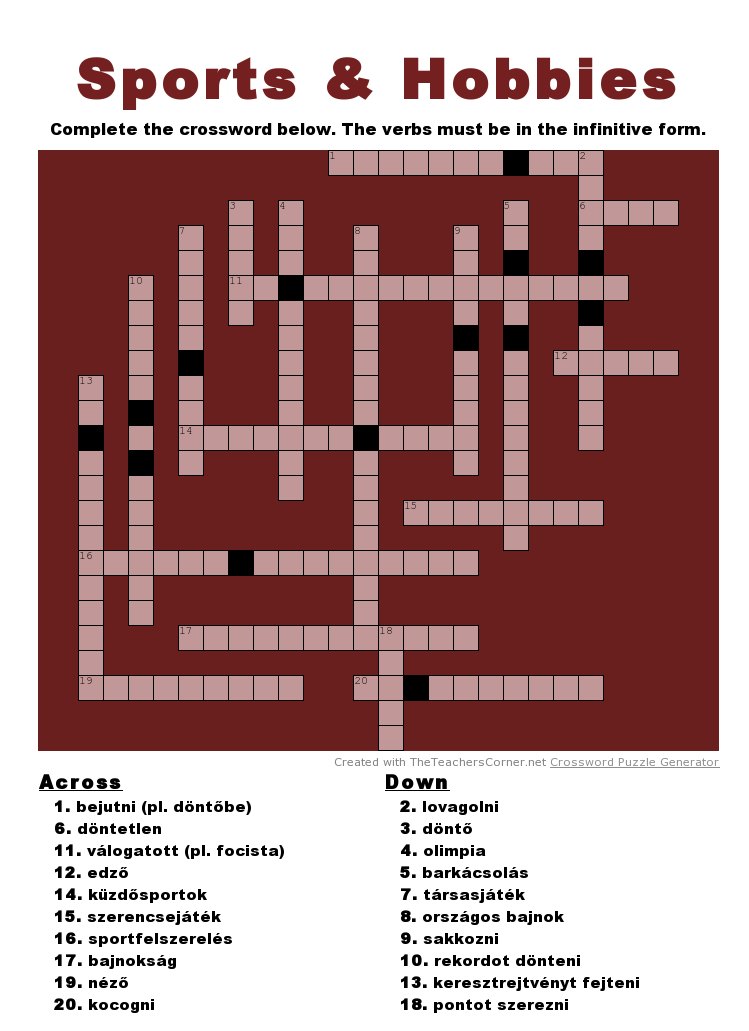

| MELLÉKNÉV FAJTÁJA | ADJECTIVE | COMPARATIVE | SUPERLATIVE |
|
kérdőszava: |
"milyen?" | "milyenebb?" | "a legmilyenebb?" |
|
értelme: |
"ilyen/olyan" | "ilyenebb/olyanabb" | "a legilyenebb/legolyanabb" |
|
szabály: |
✿ | ✿+ER | THE ✿+EST |
|
R Ö V I D |
|
|
|
|
szabály: |
♚ | MORE ♚ | THE MOST ♚ |
|
H O S S Z Ú |
|
|
|
|
szabály: |
▲ | ❅ | ❤ |
|
REND- HA- GYÓ |
|
|
|
|
HASONLÍTÁSOKBAN |
AS [adjective form] AS | [comparative form]+THAN | nem hasonlított, KIEMELT |
|
HASONLÍTÓ JELENTÉS |
'olyan...MINT' | 'valamilyenebb MINT' | 'A LEGVALAMILYENEBB' |
Tehát:
She is taller than her mother. NOT more taller that
Magasabb mint az anyukája.
Her mother isn't as tall as her. NOT isn't as tall than
Anyukája nincs olyan magas mint ő.
This is the best joke I've ever heard. NOT goodest or best
Ez a legjobb vicc, amit valaha hallottam.
 nyelvoktató csatornámra!
nyelvoktató csatornámra!| ADVERB FAJTÁJA | ADVERB | COMPARATIVE ADVERB | SUPERLATIVE ADVERB |
|
kérdőszava: |
"hogyan?" | "inkább hogyan?" | "leginkább hogyan?" |
|
értelme: |
"valahogyan" |
"inkább/kevésbé valahogyan" |
"leginkább/legkevésbé valahogyan" |
|
szabály: |
☼ | MORE ☼ | MOST ☼ |
|
-LY-re végződő |
|
|
|
|
szabály: |
✿ | ✿+ER | ✿+EST |
|
RÖ- VID |
|
|
|
|
szabály: |
▲ | ❅ | ❤ |
|
REND- HAGYÓ |
|
|
|
|
HASONLÍTÁSOKBAN |
AS [adverb form] AS | [comparative adverb]+THAN | nem hasonlított, KIEMELT |
|
HASONLÍTÓ JELENTÉS |
'olyannyira...MINT' | ilyenebbül/olyanabbul MINT | a legvalahogyanabbul/-an |
Tehát:
She works hard. NOT hardly
Keményen dolgozik.
HARDLY= alig!!!
Don't drive so fast. NOT fastly
Ne hajts ilyen gyorsan.
Do you do well at school? NOT good or goodly
Jól tanulsz az iskolában?
He scored highest in the test.
Ő szerezte a legmagasabb pontot a dolgozatban.
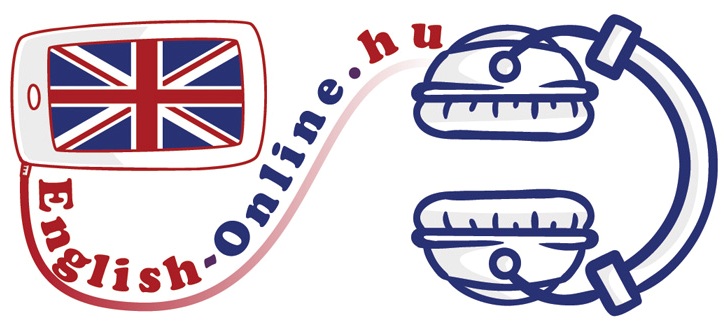
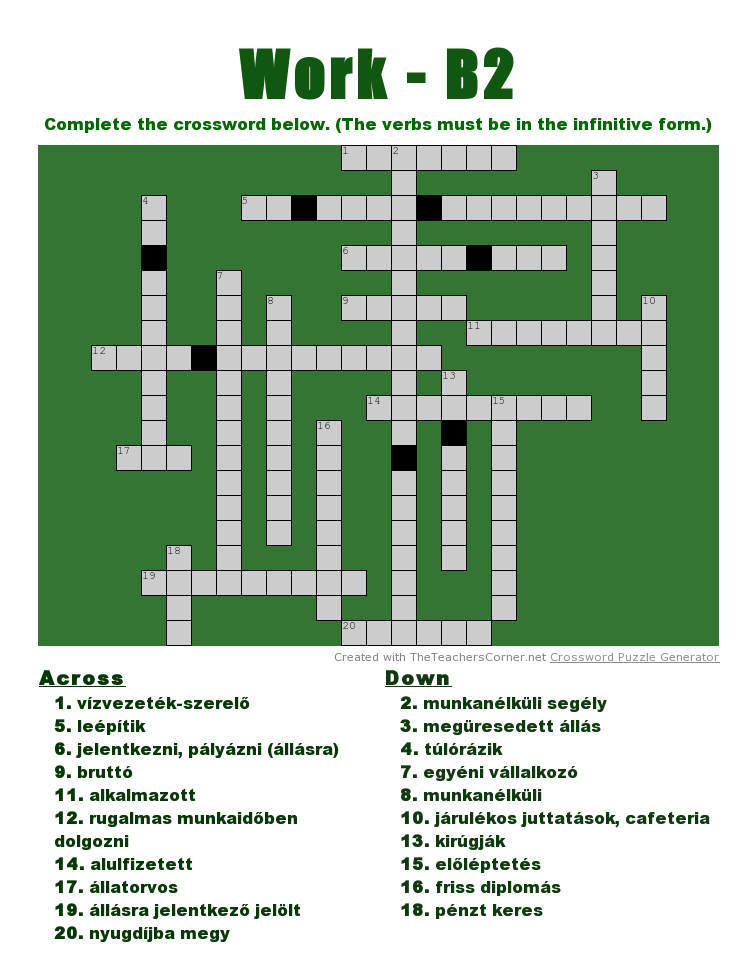

1.a COMPLAINT= panaszWe're going to make a complaint. Panaszt fogunk tenni. |
1.b COMPLIMENT= bókThank you for the compliment. Kösz a bókot. |
2.a INVENT= feltalálThe bullet-proof vest was invented by a woman. A golyóálló mellényt egy nő találta fel. |
2.b INVITE= meghívHe invited me to his b-day party. Meghívott a szülinapi bulijára. |
3.a FAIR= igazságos, vásár
Fair play does exist. Igenis létezik a sportszerűség. |
3.b FARE= viteldíjHow much is the bus fare to London? Mennyi a busz menetjegy ára Londonig? |
4.a TOUGH= kemény, durvaThis beef cutlet is tough. Ez a borjúszelet rágós/kemény. |
4.b THOUGH= bárThough G. Clooney is cool, I'd not marry him. Bár menő G. Clooney, én nem mennék hozzá. |
5.a ACCEPT= elfogadniI'm afraid, we cannot accept this excuse. Attól tartok, nem tudjuk ezt a kifogást elfogadni. |
5.b EXCEPT= kivéve
Everybody can drink except the driver. Mindenki ihat a sofőrt kivéve. |
6.a REALIZE= rájönHe didn't realize he had been dumped. Nem tűnt fel neki, hogy már dobták. |
6.b RECOGNIZE= (f)elismer
At first I didn't recognize her, she's much fatter. Először nem ismertem fel, sokkal kövérebb. |
7.a LOOSE= bőThis shirt is too loose. Do you have a small? Ez az ing túl bő. Van S-es méret? |
7.b LOSE= veszíteniBrazil didn't deserve to lose. Brazília nem érdemelte meg, hogy veszítsen. |
8.a CAFÉ= kávézó, kávéház
The nicest café in Budapest is in Lotz Hall. Budapest legszebb kávéháza a Lotz-teremben van. |
8.b COFFEE= kávéLet's have a cup of coffee. Igyunk egy csésze kávét. |
9.a HOW= hogyan, mivelHow did you come to school this morning? Mivel jöttél ma reggel iskolába? |
9.b WHO= ki(k)e(t)Who wrote Pride and Prejudice? Ki írta a Büszkeség és balítéletet? |
10.a BARE= meztelen, pusztaHe has killed it with his bare hands. Puszta kézzel ölte meg. |
10.b BEAR= elvisel, medveI can't bear this heat! Nem bírom ki ezt a hőséget! |
| SUBJECT | BE |
+ GOING TO + |
V1 (infinitive) |
| I | am |
GOING TO |
work... |
| he / she / it | is | be... | |
| you / we / they | are | go... |
Nézzünk néhány példát ennek a jövő időnek a két aspektusára! Elsőként a beszélőben már gondolati szinten korábban megfogalmazódott jövőbeli tervek, szándékok és erre vonatkozó kérdések:
ERŐS SZÁNDÉKOK, TERVEK (INTENTIONS, PLANS):(+) I am going to paint the kitchen yellow. Sárgára fogom festeni a konyhát. (+) She is going to do some gardening at the weekend. Egy kicsit kertészkedni fog a hétvégén. (-) We aren't going to go on holiday this summer because we're saving up for a car. Idén nyáron a tervek szerint nem megyünk nyaralni, mert épp kocsira gyűjtünk. (-) He isn't going to go to university, he is going to start working in a store. Nem fog egyetemre menni, hanem elkezd majd dolgozni egy boltban. (?) Are you going to get married? Össze fogtok házasodni? ☑ Yes, we are. Igen. ☒ No, we aren't. Nem. (?) Where are you going to stay in London? Hol szándékoztok majd megszállni Londonban? |
Tipp: A beszélt angolban általában olyan gyorsan mondják a GOING TO-t, hogy GONNA-nak hangzik, amit már leírva is használnak, de ez 'utcai angol'-nak számít, így nyelvvizsgán például próbáld mellőzni a használatát.

A következő jövő idejű előrejelzéseknél az első mondat teremti meg a kontextust, ezek a 'kézzel fogható jelek', amelyekre támaszkodunk a GOING TO-s jövővel kifejezett jóslatainkhoz.
JÓSLÁS VIZUÁLIS VAGY MEGTAPASZTALHATÓ JELBŐL (PREDICTIONS)(+) Her baby bump is visible now. She is going to have a child. Már látszik a pocakja. Gyermeke lesz. (+) I feel rather dizzy. I think I am going to faint. Eléggé szédülök. Szerintem mindjárt el fogok ájulni. (+) We are stuck in a traffic jam in the city centre. We are going to be late. Egy dugóba ragadtunk a belvárosban. El fogunk késni. (+) Look at those dark clouds. It's going to start raining in a minute. Nézd azokat a sötét felhőket. Egy percen belül el fog kezdeni esni. (-) They are always quarrelling. They aren't going to stay together too long. Állandóan veszekednek. Nem fognak sokáig együtt maradni. (-) She never does her homework or studies. She isn't going to pass her exams. Sosem csinál házi feladatot, se nem tanul. Nem fog átmenni a vizsgáin. (+) His late father was an aristocrat. He is going to inherit a fortune. A megboldogult apja egy arisztokrata volt. Egy vagyont fog örökölni. (?) Angelina Jolie has filed for divorce from Brad. What do you think is going to happen next? Angelina Jolie beadta a válópert Pitt-től. Szerinted most mi fog történni? |